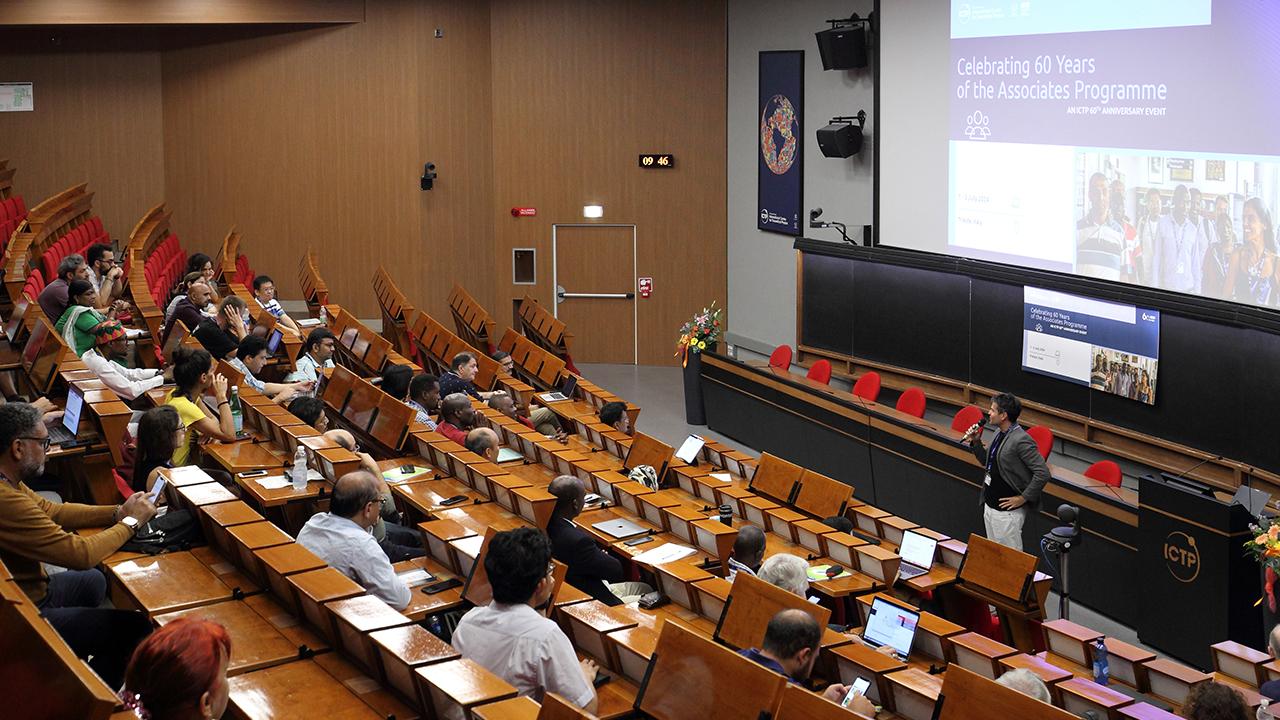
ICTP founder Abdus Salam started the ICTP Associates Programme at the very inception of the Centre. Born in Pakistan, Salam endured intellectual isolation when he returned to his home country after obtaining a PhD from Cambridge University. Through the Associates Programme, he intended to offer a solution to the sense of isolation that scientists working in developing countries often encounter and that finally led him to move back to Europe, where he spent most of his career.
The Associates Programme provides scientists from developing countries with opportunities to visit the Centre regularly, helping to foster a global science network that transcends geography, economics, ethnicity, or gender. Over the past 60 years, it has benefitted more than 3,000 scientists from 20 different countries. These researchers contribute to creating local scientific communities in their home countries, often by teaching and mentoring new generations of scientists.
From 1 to 3 July 2024, current associates gathered at ICTP, in Trieste and online, to celebrate the success of the programme, which has impacted the lives and careers of thousands of scientists from across the globe. Some 45 associates took part in the event in person and about 100 connected online.
The event was the occasion to highlight the impact that the Programme has had on the lives of many researchers over the years through the words and testimonies of past and current Associates. The most recent video in the series “Science is our Common Language”, collecting the stories of eight current ICTP associates, was shown for the first time at the event.
Over three days, the ICTP Associates who attended the event in person shared their personal path in research as well as their science in short, 20-minute talks. Many of them used this chance to highlight how the programme influenced their lives: “Being an ICTP Associate helped me a lot when I returned to Argentina after many years abroad,” explained Diana Laura Lopez Nacir, a researcher in high-energy physics from Argentina, who worked as a postdoctoral researcher at ICTP and at CERN before obtaining a permanent position in Buenos Aires, adding, “The programme not only helped me in acquiring scientific knowledge, it also gave me the know-how that I needed to start new collaborations, to strengthen the ones I already have and to enlarge my own network.”
It was very interesting for me to meet with other fellow associates and learn more about the struggles and the challenges they face in their countries.
-- Abdelmoneim Sulieman, Sudan
ICTP Associates visit ICTP at different times of the year, and they therefore usually do not have a chance to meet with many of their colleagues from across the world. “It was very interesting for me to meet with other fellow associates and learn more about the struggles and the challenges they face in their countries,” said Abdelmoneim Sulieman, a medical physicist from Sudan. “We also had a chance to give our feedback on the programme, and to say what is difficult for us and what could be improved. Knowing that we share some of the same needs was empowering,” he stated, adding “I also enjoyed discovering my colleagues' most recent findings in mathematics and theoretical physics. It was nice to have a glimpse of their research, which often concerns topics far from my field of expertise.”
The event also included several colloquia providing tips and best practices in aspects collateral to the work of any research scientist, such as science communication and grant writing. A panel discussion involving associates Amanda Weltman from South Africa, Khadim Mbacke War from Senegal, Carolina Brito from Brazil, and Prasenjit Ghosh from India, and moderated by Yenca Yenca Migoya-Orue, a research scientist in ICTP's Science, Technology and Innovation section, addressed the struggles and difficulties of managing a career in science while having a family. “As a community, scientists are finally starting to understand that in order to address the gender gap in science, it is crucial that research institutes such as ICTP set up an infrastructure to assist scientists who come with their families. Women are often the ones whose possibility to travel abroad and for a long period of time is most affected by the fact of having a family, and that can hugely impact their careers,” said Brito.
In order to address the gender gap in science, it is crucial that research institutes such as ICTP set up an infrastructure to assist scientists as they visit with their families.
-- Carolina Brito, Brazil
Participants also attended a presentation session on the ICTP Global Science Portal, an online, community-building platform that ICTP has just launched and that will ultimately connect the whole ICTP community across the world. “This new platform will be a great tool for us to keep in touch and build our community,” said Sulieman.
This year also marks 10 years of close collaboration with the Simons Foundation. Starting in 2014, the Foundation has financed the visits of 71 associates, and those of 60 of their young collaborators, thus accelerating the virtuous process through which the programme impacts scientific communities across the world. To mark this 10-year anniversary, an article describing the programme through the words of several researchers who have been Simons Associates has recently been published on the Simons Foundation's website.
Photos of the Associates Programme anniversary celebration can be viewed on ICTP's Flickr page.
















